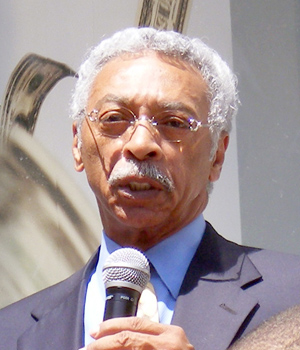“Nobody is trying to deny the seriousness of getting this under control, but does it have to be on a billboard?”
– Birmingham Mayor Larry Langford
Yes, as a matter of fact Larry, it does.
But apparently making Jefferson County residents aware of a syphilis outbreak is more of a detriment to our efforts for attracting new businesses into the region than a necessity to make sure that it does not become worse than it already is. In case you didn’t see Saturday’s Birmingham News story, two of our elected leaders feel as though bus advertisements calling attention to the fact that we have the #1 concentration of syphilis cases in the United States were portraying a bad image for the region (among other things).
While they are only removing ads announcing the outbreak off of the sides of buses, it takes away a valuable tool available to the Jefferson County Department of Health in this battle of educating the public, one that they should be commended for. It was doing what it was supposed to do – catching the attention of those that saw the signs even if only for a few seconds at a time.
If there is anyone that understands the importance of catching the attention of people in short, simple sound bites, it is the current mayor of the city of Birmingham. Mayor Langford provides just enough information to pique our interest and then he moves on to the next 6 or 7 things on his agenda. We stay just confused and bombarded long enough for the next idea to be planted and then the questions that need to be raised never are. It’s a shame, since some conversation may actually make some of these ideas better. In this case it’s a real shame that he doesn’t realize that the Department of Heath is simply taking a page out of his play book.
He’s done something again, only this time it’s something that could become a bigger issue if not handled properly. I’d like to know if he and Commissioner Fine-Collins plan to have the health department remove the billboards and television ads as well? If so, we’re going to use taxpayer dollars to remove ads that were partially paid for by taxpayer dollars trying to educate the taxpayers about a serious issue — like the logic?
Maybe he has a secret plan to use that bully pulpit that mayors possess to make sure that more people are aware…
Maybe.
Maybe spending taxpayer dollars to sweep one of our regions issues under the rug could be better spent making sure that we dealt with the outbreak appropriately, making sure that everyone was aware of the issue.
The problem with both of those solutions is that they sound too logical.
As a city recognized as a national leader in medical research, maybe the idea of making people aware of the issue constitutes our area hospitals and medical leaders doing the job that they are best known for. And it’s not like the ads haven’t had an effect, it has encouraged more people to go in and be tested for symptoms.
We can’t call the kettle black without making sure that we air all of our dirty laundry as well. We’d actually had a story prepared about the outbreak more than a month ago; however we were waiting for a list of current solutions that were being undertaken to be completed before putting it up on the site. We felt as though that was most important – making sure that solutions were presented. Unfortunately, most of us are only now writing about the issue because Mr. Langford and Ms. Fine-Collins finally gave us a reason to do so.
So we decided to run the story this morning (if you didn’t come here directly from the post, head on over to the Newsstand to take a look). Even if you feel as though this issue cannot hit you personally, it is important enough to the overall health of our region to take a good, hard look at it and what can be done to assist with handling it.
So maybe recent stories about Birmingham’s potential are just not powerful enough to overcome this outbreak as selling points, at least in the eyes of our city’s chief executive. But I think I’d rather have folks coming in to join this transplant in a movement to make the city a better place than have them wonder why we hadn’t accepted the situation and admitted to it up front — completely.
André Natta is the managing editor of The Terminal.








Riding towards the right solution
I have this one habit that came to light when I worked for my previous employer that’s always led to some fun conversations (and smiling faces) when expense reports from trips came in. The best example of it was when we were planning for our first trip to Baltimore, MD. My boss decided that he needed to rent a car for the trip, while I said that I’d have no problem getting around on ground transit. I ended up riding in from BWI on their light rail service, eventually pulling up in front of Camden Yards (where I caught half an inning through the gates). I then rode the bus from the ballpark to the city’s Fell’s Point neighborhood, where I got a chance to explore one of the very communities I would be learning about during that conference while getting to our hotel. I walked the rest of the time there.
By the time he met me for dinner that evening, he’d sat in “baseball traffic” for more than 2 hours while trying to get in from the airport. I’d gotten into town in about 40 minutes (including a walk that could have easily been a transfer to another bus to get me there).
My trip to Seattle, WA was already booked before I resigned from that job, so I attended the conference anyway (looking back it was one of the best decisions I ever made). Residents in that region enjoy knowing that you can take an express or a local bus from the airport into downtown for $1.25 – each way. My counterparts were paying $15 each way to get into the city using a charter bus service. People from all walks were on the bus – flight attendants, business people heading to the Boeing plant, travelers and residents all sitting next to each other. Yes, they were building a light rail line from SEA-TAC, but it was due primarily because of the impressive use of the bus service already available, which was slated to continue.
While I’ve always had to scramble to find a ride to get to and from the airport here, since I’ve lived here I’ve never not used mass transit to get where I need to from the airports of the cities I’ve flown into.
Growing up in New York probably helped shape my belief that buses are fine way to get around (if they can get you where you want to go). For many people in my hometown, despite the availability of subway service in some of the denser areas of the city, the bus is an important piece of their commutes. It’s safe to say that they are the workhorses of most mass transit networks. Some communities appear to want the cart before the horse, including ours.
At the end of Regional Planning Commission director of transportation and community planning Bill Foisy’s presentation to attendees at Thursday’s ONB Breakfast Briefing about work being done to deal with increasing traffic congestion in Birmingham, someone raised their hand and asked if we would ever see light rail service in Birmingham. Foisy tried to explain that normally you’d see such services connecting cities and not just within a city and that any rail system that returned to metro Birmingham (we did have a pretty well-respected streetcar system at one point) would not be successful until we fixed our bus system. I’m still picturing those faces among the crowd having this puzzled “Well, why can’t we just replace the buses with light rail; they’re cooler?” looks on their faces.
It doesn’t make sense to build a system if those that need to be riding don’t use the current system. If those that need to be riding look down on the current system as something not good enough for them. If they don’t realize that the buses will give them a way to get from that light rail station to their homes if needed.
Call me crazy, but normally if a city wasn’t built like a New York or a Chicago by rail service you normally look to light rail as an upgrade to a system that is functional and that enjoys fair ridership. As far as who is to blame for Birmingham’s current system’s plight, I’ll leave that to everybody else and I won’t even get into whether or not those that currently ride the system are treated fairly or given adequate service.
My point is that fixing the problems with our system (especially with gas prices poised to rise), whether they be new buses, revamping the routes taken by buses, their frequency and their reliability is more important now than ever. It must be addressed and those riding now satisfied before delusions of grandeur are sought that we are not prepared for. We can’t build our way out of traffic issues either, and since our funds are beginning to dry up, wouldn’t a shift in philosophy towards assisting in transit improvements be better?
I’ll be thinking about that during my trip to Chicago in the spring, as I ride in from the airport on the El – and then take the bus.
André Natta is the managing editor of bhamterminal.com.
Leave a comment
Posted in Commentary
Tagged Alabama, Birmingham, editorial, issues, traffic, transit